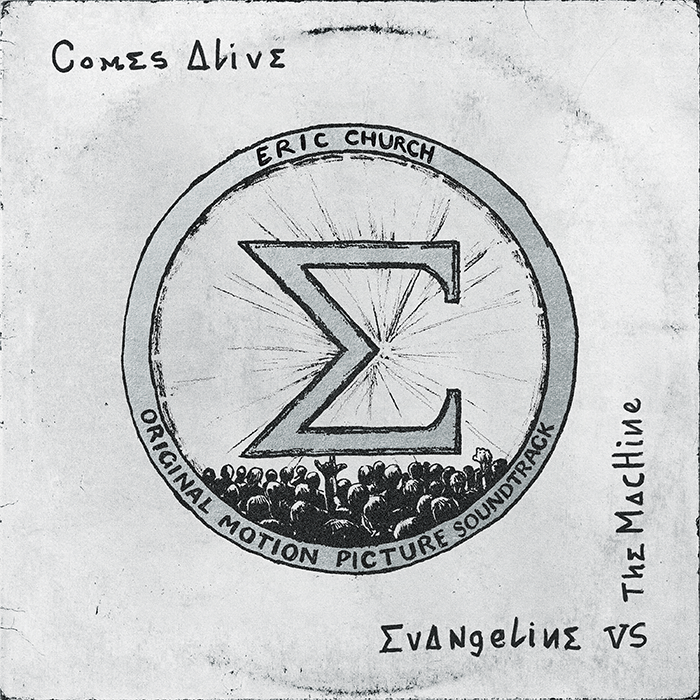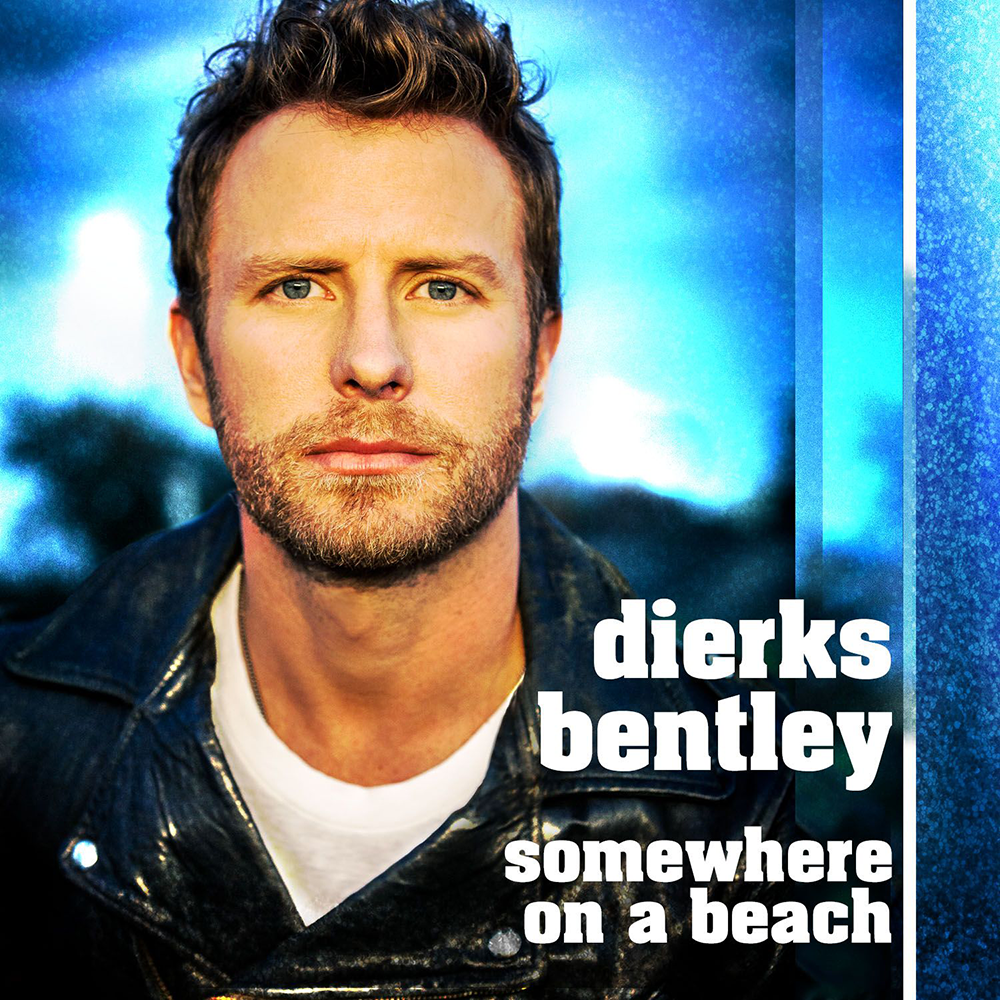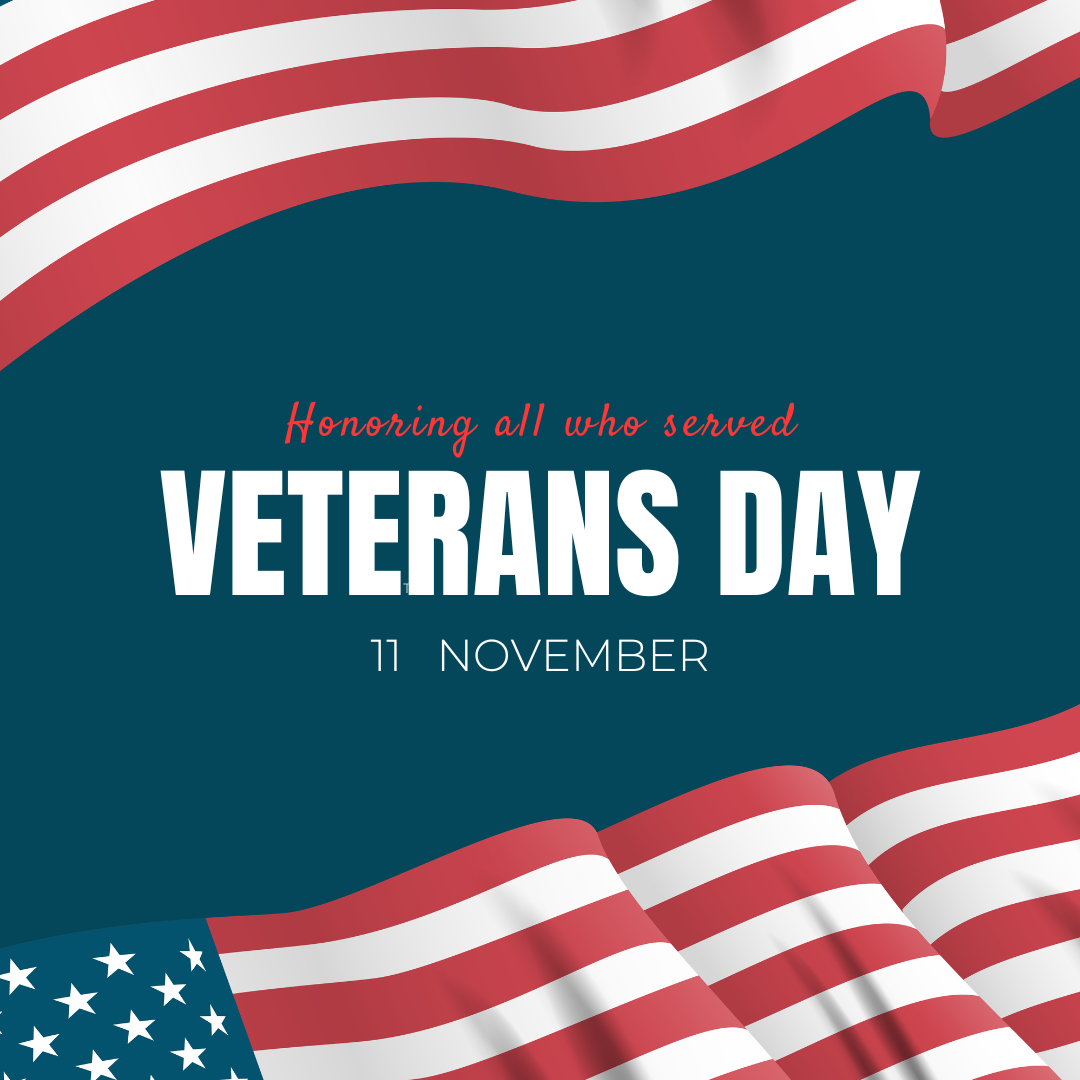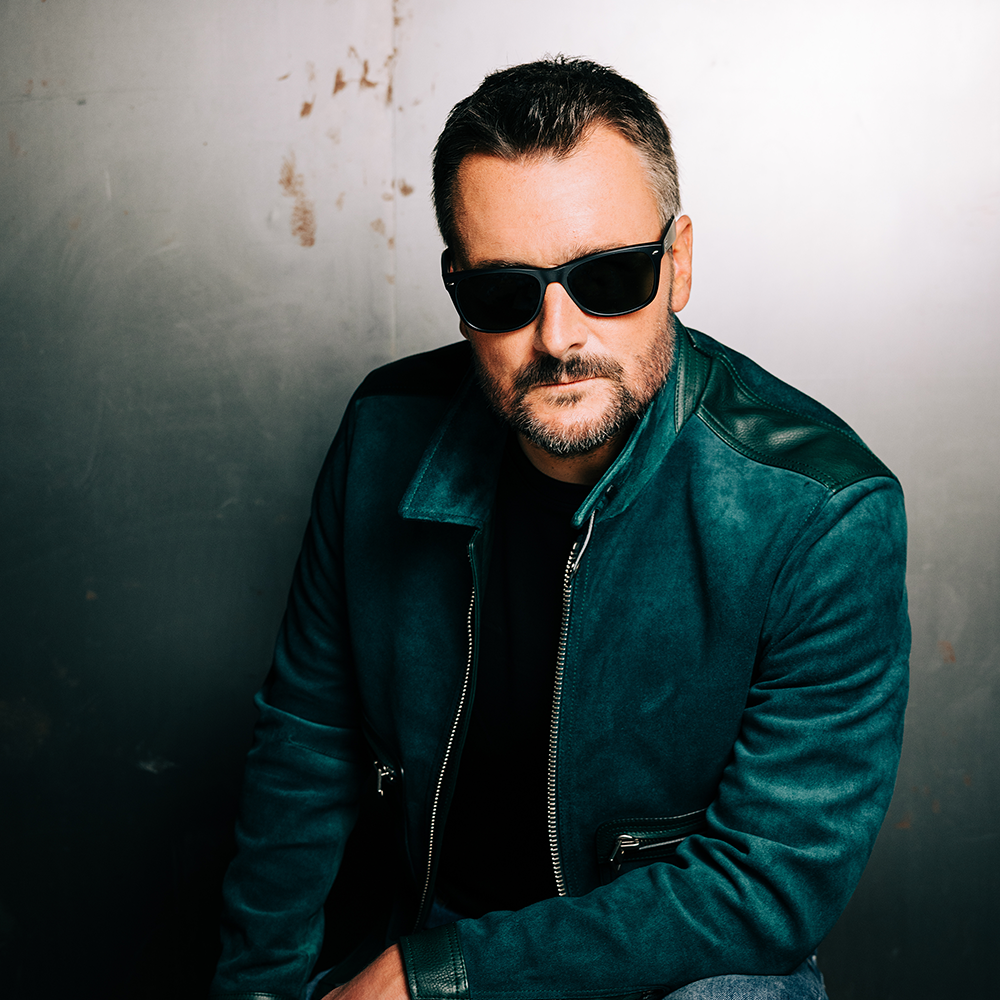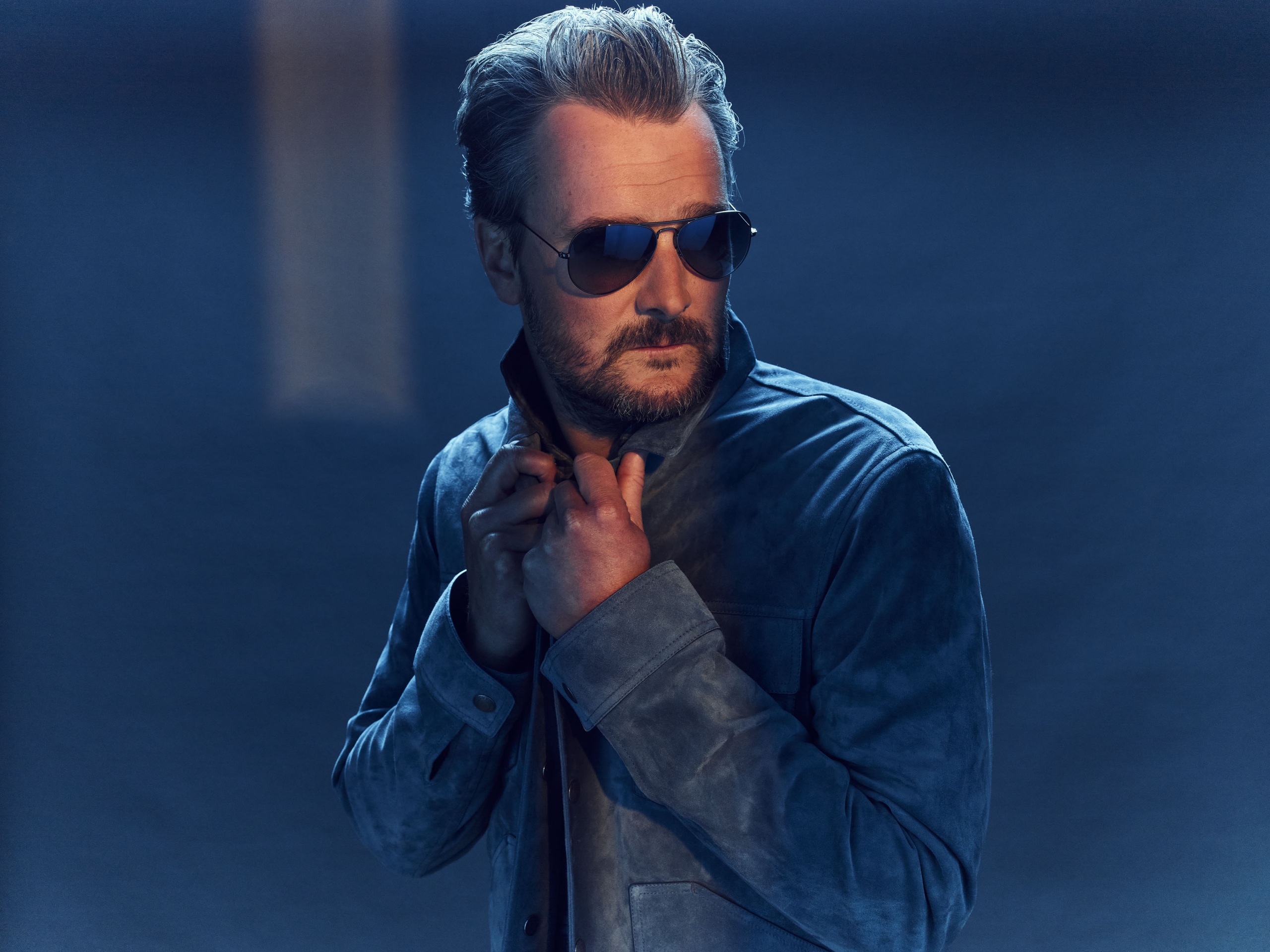Listen to the New Album HERE
“Hands of Time” Official Video OUT NOW HERE
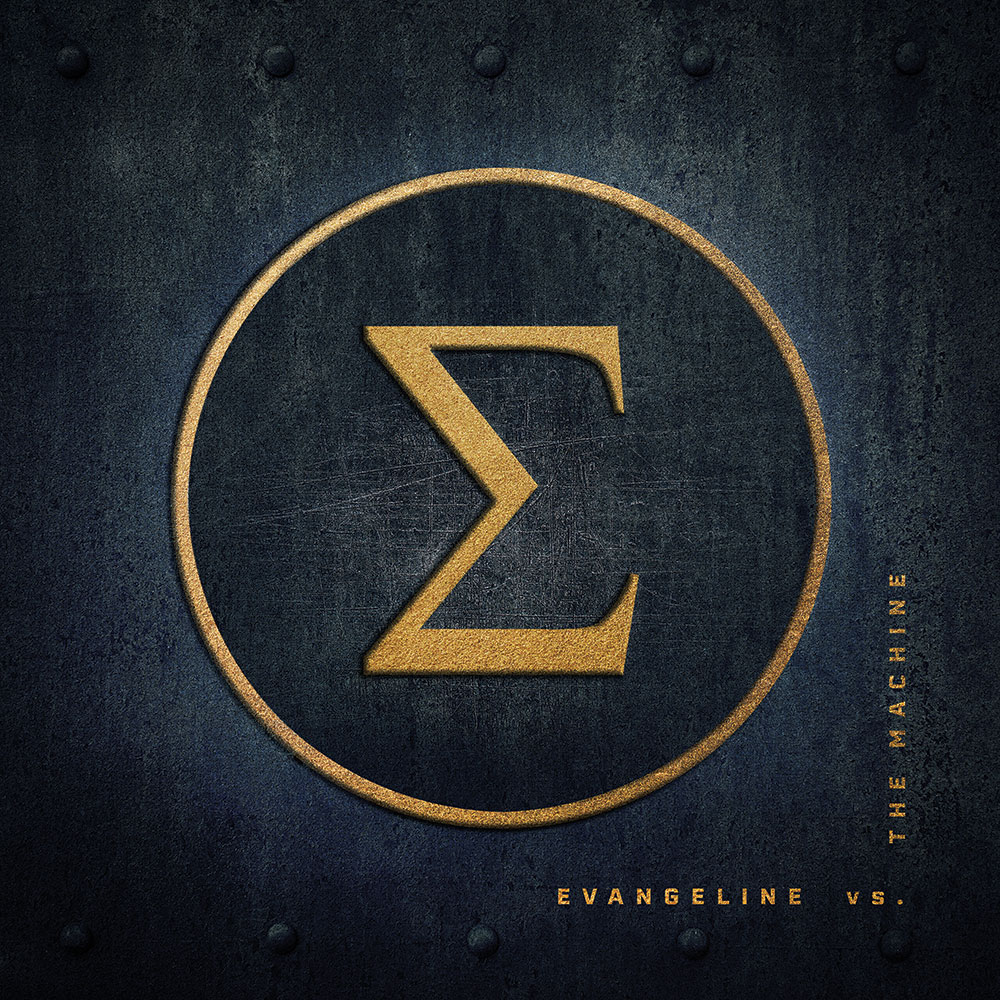
With Rolling Stone celebrating Eric Church for “the most ambitious, vulnerable album of his career” in the lead review of the May print issue as Evangeline vs. The Machine arrives today, May 2, the 10-time GRAMMY nominee embarks on what is perhaps the most radical chapter of his singular career spanning nearly two decades of rule-breaking and risk-taking music. Listen to the new album HERE.
“People keep asking me about the ‘vs.’ in the title,” Church notes of his eighth studio album, named among today’s best releases by NPR’s “All Things Considered.” “They want to know, is it a battle, Eric? And I say, yes. It is a battle. A battle for everything creative. That’s the whole reason I’m here in the first place.”
As one of country music’s most fearless storytellers, Church knows that it’s never been a more important time to be a leader in this kind of war. There’s no in-between in life, in art, in a world where a computer program can create a song in a blink of an eye, but we can’t seem to keep our children safe or our people connected. So, you can fall in line with the machine, or you can fight against it. And Church has only ever been a fighter.
The world of Evangeline vs. The Machine is one of experimentation, creativity and surprise. It is a collection of eight songs made to be listened to front-to-back, from an artist who has never given up hope on the power of the album. While suits in boardrooms are obsessed with manufacturing 30-second “songs” that go viral, prizing profits over creative freedom, Evangeline vs. The Machine refuses to surrender. It invites you to stay and fight with it.
For years, Church has become the gold standard for artists, in country music and far beyond, who refuse to play by the rules and insist on operating from their creative compass alone. He brought hard rock into country music with The Outsiders when everyone scoffed – and now it’s the roadmap for how to blend the two for this generation and beyond. He dropped Mr. Misunderstood on fans’ doorsteps without any warning; he fought scalpers to make sure Church Choir members could get tickets to his shows. When the machine demands we go left, he pushes right. When it fails, he shows up.
Church wrote the song “Evangeline” a few years back, before the album as it arrives now had been conceived. It opens with a declaration: “Still the man that I was, just a little more grey, a little more stay, a little less sting in my buzz. Still chasing a song between the verse and a bridge, I know life is just a chorus we sing along.” It is an ode to the muse that moves us, and the way that art and music bring us out of the darkness, if we let it.
“I’m basically pulling the curtain back and saying, ‘this is how I save myself,’” Church says. “I’ve been around a while now, and you know me and I know you, but I’m still bringing it back to the thing that lights a fire in me. And it’s still music.”
For Evangeline vs. The Machine, Church, producer Jay Joyce and longtime manager John Peets made sure that no old habits or tried-and-true techniques would keep things stale. Having no involvement in pre-production – as has usually been his custom – Church arrived to a full orchestra at the studio, ready to respond in real time with three or four takes, at most. He loved every second of being surrounded by so many musicians of all disciplines, forming a wall of sound that also included longtime collaborator Joanna Cotten and a backing choir.
“They were all able to contribute to the color of the canvas,” Church says. “They’re not just echoing what you’re singing, they’re playing a role in contributing to it. For a songwriter, that’s so inspiring.” At one point Church looked around, and he felt like he was in the middle of a movie set. “It was just so different than anything I’d ever done, so theatrical and cinematic. I just loved it.”
The whole thing came together in four days, originally as a six-song album. “Bleed on Paper” was the first recorded, a track that digs deep into Church’s own personal way of healing, in the best way he knows to fight: not just against the machine, but life’s darkest and most difficult moments: with song. “That’s the way I’ve dealt with tragedy and triumph and hurt and devastation in my life,” he says. “With a pen in my hand and a guitar.”
Church shows next what that looks like in real time: “Johnny” was written in the wake of the Covenant School shooting in Nashville. He sat in the parking lot the following morning after dropping his boys off at a nearby school, overcome by the tragedies in our world and how little we do to prevent them. Inspired by the timing of Charlie Daniels’ “The Devil Went Down to Georgia” coming through his speakers, he drove home and started writing immediately, using music as a salve to soothe those wounds. It all hinges on a central line: “machines control the people, and the people shoot at kids.” Phones, computers, misleading social media, a poisoned political climate. Suddenly, this is about far more than just art. It’s about survival.
AUDIO CUT X CUT:
“With Hands of Time, it was a song that was an older song. I’ve had that song since probably 2022. And it just really became, it found its moment. It found the thing that but it plays in both worlds a little bit. It’s a song that could have been recorded on another album, another project that didn’t have this instrumentation, but it also works with this instrumentation. So it was a little bit of a chameleon. And to me, it’s a great intro; it’s a great welcome to the waiting room of what Evangeline vs. The Machine is album-wise. It’s come on in, get as many people as we can in the waiting room, and then let’s take a pretty incredible musical journey, which is this album. So it played a key role, especially for radio and for the commercial nature of what this album is. And here it is, Hands of Time.“
“I heard Bleed on Paper first time several years ago. It’s an older song. And I was at a songwriter’s event with Casey Beathard and we were there to see his son Tucker play. And he was playing acoustic and he got up and he played Bleed on Paper. And I remember just immediately when I heard it, I looked at Casey and I said, you, do you write, do you write, you’re on this one? He said, yeah, said, hmm hmm well done. And I said, this, that’s, that’s sums up my life, right? I mean, that’s where my emotions come out, the pain comes out, where joy comes out. That’s where I deal with everything is when I put pen to paper, you know, and there’s a lot of that on this record. I had had it in my head for a long time. And as we, when I was looking at the instrumentation of this album, and what songs would fit in one, what songs wouldn’t, I just kept thinking about that song and I kept remembering that song, and I was like, man, song, would you put strings on that and do some really cool musical elements to that and that thing would just really, really, really get dramatic and theatrical and cinematic. So went and cut it. you know, it’s my relationship with Casey goes back to the very beginning and you could probably trace back to as far as outside cuts go in my entire career, there’s a Beathard on it.”
“Johnny’s probably the song that directed the emotional part of this album with as far as the, where it really came from. I played Johnny at the residency shows and with a choir and knew that I had to have Johnny on our next project. I had to be there, right? And I think that that is part of where Evangeline vs. Machine– people talk about instrumentation and concept or theme, it was really Johnny that I knew I had to have. Like I knew I had to have that one. That was my cornerstone of the album. And there’s a way to present that. And the way that we used musically is really what led to this whole album. But it’s a song, and I’ve told this story many times, but when the Las Vegas shooting happened, there was a, there’s a wound there. And then it never really heals. Yeah, there’s a hurt and it just kind of scabs over but doesn’t heal, and when when the Covenant shooting in Nashville happened, it just rips the scab off. And they’re especially having young kids, especially being your city. Especially knowing some of the people involved in that that devastation. My my kids go to school mile mile and a half two miles whatever, from Covenant, and I remember the morning the day after the shooting, when I dropped my kids off, as a dad, was the hardest thing I’ve ever done. And I didn’t want them to go. And they got out of the car, and everybody, all parents, and all the teachers and principals, and everybody were out front to welcome them. And a lot of them had tears in their eyes. A lot of them had tears rolling down their face. And the kids go in, and I pulled over in the parking lot there. And I didn’t know what I was doing. I just didn’t want to leave. So I pulled in the parking lot, and I sat there and I felt helpless and scared and all these emotions, angry. And I just happened to look to my left and right and there was a line of cars parallel to mine of parents doing the same thing, dads and moms. And we all were sitting there doing the same thing and nobody knew what to do. Everybody was helpless and as fate would have it, I sat there maybe an hour, and as I sat there, the music was in the background. It was just down low. Devil Went Down To Georgia came on by Charlie Daniels. And it was just played in the background. I wasn’t really focused on it. I just heard it. And there was a line in the song, you know, Johnny, rosin’ up your bow and play your fiddle hard ‘Cause Hell’s broke loose in Georgia and the Devil deals the cards. And if you win, you get this shiny fiddle made of gold, but if you lose, the Devil gets your soul. And it just, I remember saying to myself, if only the devil was confined to Georgia, because he’s everywhere. He’s everywhere in the world. He’s loose. And boy, we could sure use Johnny right now to come send him back to hell. And that was playing in my head as I pulled out after the hour, hour, however long I sat there. And I came back and it just over and over me I kept thinking Johnny, Johnny, Johnny. I had no idea where it was going. I just over and over and picked up a guitar when I got back to the house and started writing Johnny. And there’s actually a line in Johnny that led to the album title in an indirect way, but you know, now machines control the people and the people shoot at kids. And that’s a lot of where this vs the machine, you know, human spirit and creativity in your life and how that fight is going on every day. And that’s a lot of where the title of the album came from. This is Johnny.”
“Storm in Their Blood is another song that I really wrote for the Evangeline vs. the Machine project. I was looking for this kind of Viking feel vocally around what is a pretty me lyric. It’s something that could have been on a lot of different albums in our career. William Wallace, Geronimo, and talking about my granddaddy and you know, sometimes we’re all, there’s people born with a storm in their blood. So it’s got, I’ve done some things like that, but it was the presentation of it that just gives it this dramatic cinematic visual. And that was a song that I worked on, you know, during the project. I knew I had paid pieces of it and I was like, this would be really cool. So I sat down and finished it, and the vocal that leads into that is back to the interludes that I was talking about. My favorite part might be before, if you were just starting Storm in Their Blood, just before that part, there’s that low chant that starts to bring it out of our last interlude and into the song. There was a transition period. It’s just a really cool moment musically. And then you’re at the song, right? So it’s the arrival there. And it’s just some great vocal work on that song. Some great string work and horn work all over this album. There’s a ton of those moments that you’re actually letting other people do things creatively and interpret what your music is. They’re taking the song that I had written, and they’re putting their own interpretation creatively on it. They’re getting to participate in it. And I think that just getting that many people in a room and that many creative minds in a room and talent really shows a lot in Storm In Their Blood. My youngest son, when you get to the musical part where the voices are playing in the middle of song, he calls it the lion king part, because it’s got all these voices and it sounds like a lion running across the Serengeti. So I laugh at that part every time I get to that part, but that was Hawk’s take on that one. Here is Storm in their Blood.”
“Darkest Hour was the fastest turnaround from written to recorded was written on the 16th of August. It was recorded on the 22nd. And it was really quickly, a lot of the Heart and Soul project, you know, where a song is born, a song is recorded. But a lot of that just came from, I don’t have a ton of music in my catalog in the career that is like Darkest Hour from a from a hope standpoint. There’s a lot of different complexities and storylines throughout other songs in the career that they touch on it. But this one was very direct, in it’s hope. And in its, we’re all gonna be there, and I’ll come running. I’ll light your way. And it was just a, it was a very hopeful. And I thought it provided a really good balance against Johnny in this album because of the question of, we’re holding on to hope, we’re hanging by a thread. Those lines of, know, Johnny, know, we need saving. What’s happening in the world, whether it’s the machine or it’s all these things, we need help. And I think what was great about that is Darkest Hour kind of answers that. And it’s in your Darkest Hour, which Nashville was having at that time. I’ll come runnin’, I’ll light your way. And unbeknownst to me, that was about to play out even more directly in my life with Hurricane Helene. And so the song was written and recorded just before Hurricane Helene. And then Hurricane Helene happened. And I was in the middle of listening to the mixes and trying to hone in on some stuff with Darkest Hour. And so I was listening to it all the time, know, earbuds or in the studio. And when Hurricane Helene happened it, I couldn’t get out of my head in your darkest hour, I’ll come run in your darkest hour or light your way. Baby don’t give up. I’ll do any, everything in my power to take even a minute off your darkest hour. And that all those people in North Carolina were in their darkest hour. And those are my neighbors. Those are friends. Those weren’t just people that, you know, I saw on TV or weren’t just people I read about. I knew those people. I knew a lot of them. Our own community there in Avery County was heavily affected. And, um, I wanted to, I thought that song really summed up how I felt at that time.”
“Evangeline, which also ends up in the song title, know, with the Evangeline vs. The Machine. Evangeline is such a, I love the word and I honestly, I hate to say this, but I really wrote, I started writing the song just based on the name. I just thought it was such an older, cool name. You know, I thought Evangeline was a cool name and really kind of started there, you know, and then trying to, what do you know, what is this? What is, how does this work into a song? I’d love to make this into a song. And then I started really writing about where I am right now in my life, not knowing really it was Evangeline. It was an interesting song, right? And I wrote all the way through the first part of that song to the Evangeline part on my own. And then I got some help. But I was kind of going through it, still the man that I was, a little more gray, a little more stay, a little less staying in my buzz. And I just started writing about being in my life right now and the age that I’m at. And it just became kind of autobiographical.”
“Rockets White Lincoln’s a funny story. I was in the middle of recording, you know, I’d done the six songs and was looking around, but I was also in the middle of my residency. So we’ve got music that we’ve recorded six and it’s kind of on the side and I’m going down to play the residency and I have some buddies that came, coming from back home. I grew up with them. They’re my OG crew and they come into town and they come to the residency show and I was going fishing with one of them at my property in Nashville. And he was on his way out. I said, hey, let’s, you know, I had a show actually that night, a residency show. And I said, let’s fish around. You know, it was hot at the time. I said, let’s try to fish around, you know, five and we’ll give it a couple hours and I’ll head down to the show. And he get, he got there and he pulled up to the gate and he couldn’t get in the gate. So he sent me a text and he said, Hey, I’m at the gate. You may not recognize the car. I’m in Rockets White Lincoln. And I just read it and I buzzed him in, but the whole time I’m thinking, wow, I can’t. Like I’m imagining in my head this old school drop top, cowboy horns on the, cow horns on the front of this thing. And it pulls up and it’s like a navigator. I was like, well, that’s not what I thought Rocket’s White Lincoln was going to look like. But when it was in my head, I had this thing in my head. we started talking and I knew Rock’s a buddy of ours. We call him Rock and his last name’s Rock. We call him Rocket. He was saying, you know, Rockets coming to show tonight. We’re just kind of talking. And I just over and over, I kept going, man, Rockets White Lincoln is cool. There’s gotta be a way. That’s just, that’s a story. That sounds like a book. That sounds like a movie. That sounds like all these things. So the next morning after the show, um, we did the show that night. I hung out with, with rocket and, and, and my buddy and we were all sitting there and just talking and hanging and we stayed late. And I got out the next day and just kind of started this whole thing of what kind of what that night was. You know, we were going downtown and you’re trying to just get away for a night, you know, and you got your baby beside you and you got your buddy in the back and he’s got his girl. And you just going for escaping what’s happening in the world, escaping the machine. You know, you’re just escaping that and, and, going down to, to enjoy life with each other. And it just, it just, it just, it just happened. It fell out. I wrote the song and maybe 20 minutes, maybe it’s one of the fastest writes of my career ever. I mean, that usually, that usually never happens with me. And it, I mean, it wasn’t a half hour and I was done with it. I put it down and I sent it to Jay and I told him the story and I was like, this is crazy. But he was laughing with the navigator part and we went through the whole deal and he’s like, man, let’s cut that. And he said, it has that smile quality you’re talking about. I said, on this album? And he said, yeah, let’s cut that. He said, come in, let’s cut that. So we went in and Jay did his stuff to it and took it a whole different way than just me and a guitar. And it’s just a fun track. And it does make me smile now when I listen back to it. It has a smile element on this album and I’m really happy that it found its spot. This is Rockets White Lincoln.“
“I knew the song Clap Hands, I’m a big Tom Waits fan. And what’s interesting as it parallels to the record, one of the most creative songwriters and live performers in all of music, in any genres, Tom Waits. You never know what you’re gonna get from an album, you never know what you’re gonna get from a performance. I was watching something and I need to go back and figure out exactly what it is, but it was on either Netflix or it’s a movie and it was on the outro. The movie had ended and it was on the outro part and Tom Waits version of Clap Hands came on. And I’m sitting there and I’m hearing it and I’m just in my head. It was on my TV so I could pause it. And I paused what was happening. I rewound it to the start of it. And I grabbed my guitar and it just hit play. And I started, I just worked up the progression and you know, keep in mind, I just watched this thing so it’s already, it’s already playing the role of a soundtrack to what I had just seen visually. I just saw it and it’s playing that role. And I start just noodling with it a little bit. I said, man, that could really, really be cool with what we have in the studio right now with the group of musicians that we have with that instrumentation. This could be cool. This could be wild. You we could be out there wilding with this one. And I just worked it up, just me. And I sent it to Jay and I said, hey, I really think that this could be, I really think that this could be a cool way to, to put this song on the album in my, am I crazy? And we as, as, as fate would have it the next day, we had a studio session booked. And as soon as I sent it to him and I said, hey, we, should do this? Is this crazy? He said, he sent me a text back and said, I’ll see you at 10. This is Clap Hands.”
Evangeline vs. The Machine Track List
Lyrics & Full Credits Available HERE; Songwriters in Parentheses
1. Hands Of Time (Eric Church, Scooter Carusoe)
2. Bleed On Paper (Tucker Beathard, Casey Beathard, Monty Criswell)
3. Johnny (Eric Church, Luke Laird, Brett Warren)
4. Storm In Their Blood (Eric Church)
5. Darkest Hour (Eric Church)
6. Evangeline (Eric Church, Luke Laird, Barry Dean)
7. Rocket’s White Lincoln (Eric Church)
8. Clap Hands (Tom Waits)
Free the Machine Tour
*on sale Friday, May 16 (all others on sale Friday, May 9)
Sept. 12 || Pittsburgh, Penn. || PPG Paints Arena || Elle King
Sept. 13 || Columbus, Ohio || Nationwide Arena || Elle King
Sept. 18 || Philadelphia, Penn. || Wells Fargo Center || Elle King*
Sept. 19 || Boston, Mass. || TD Garden || Elle King
Sept. 20 || Brooklyn, N.Y. || Barclays Center || Elle King
Sept. 25 || Green Bay, Wisc. || Resch Center || Marcus King Band
Sept. 26 || Milwaukee, Wisc. || Fiserv Forum || Marcus King Band
Sept. 27 || Des Moines, Iowa || Wells Fargo Arena || Marcus King Band
Oct. 2 || Detroit, Mich. || Little Caesars Arena || Marcus King Band
Oct. 3 || Lexington, Ky. || Rupp Arena || Marcus King Band
Oct. 9 || Indianapolis, Ind. || Gainbridge Fieldhouse || Marcus King Band
Oct. 10 || Grand Rapids, Mich. || Van Andel Arena || Marcus King Band
Oct. 11 || Cleveland, Ohio || Rocket Arena || Marcus King Band
Oct. 23 || Salt Lake City, Utah || Delta Center || Charles Wesley Godwin
Oct. 24 || Boise, Idaho || ExtraMile Arena || Charles Wesley Godwin
Oct. 25 || Spokane, Wash. || Spokane Arena || Charles Wesley Godwin
Nov. 6 || Vancouver, B.C. || Rogers Arena || Charles Wesley Godwin
Nov. 7 || Portland, Ore. || Moda Center || Charles Wesley Godwin
Nov. 8 || Seattle, Wash. || Climate Pledge Arena || Charles Wesley Godwin
Nov. 13 || Sacramento, Calif. || Golden 1 Center || Charles Wesley Godwin
Nov. 14 || Fresno, Calif. || SaveMart Center || Charles Wesley Godwin
Nov. 15 || Inglewood, Calif. || Intuit Dome || Charles Wesley Godwin
About Eric Church
A seven-time ACM Award winner, four-time CMA Award winner (including 2020’s Entertainer of the Year) and 10-time GRAMMY nominee – including three nods for Best Country Album, Eric Church has built a passionate fan base through his critically acclaimed catalog of music. Church’s October 2024 release, “Darkest Hour,” saw the superstar signing over all of his publishing royalties to the people of North Carolina to provide immediate relief following the devastation of Hurricane Helene while also providing ongoing funds to support a more resilient future for his home state. The song is featured alongside current single “Hands Of Time” on his brand new album, Evangeline vs. The Machine, marking his first new music since 2021’s Heart & Soul triple album (“Stick That In Your Country Song,” “Hell Of A View”). That project followed prior releases including RIAA Gold-certified Desperate Man (“Some Of It,” “Desperate Man”), Platinum-certified Sinners Like Me (“How ’Bout You,” “Guys Like Me”), Carolina (“Smoke a Little Smoke,” “Love Your Love the Most”) and Mr. Misunderstood (“Record Year,” “Round Here Buzz”), Double-Platinum certified The Outsiders (“Like a Wrecking Ball,” “Talladega”) and 4x Platinum-certified Chief (“Springsteen,” “Drink In My Hand”), as well as 32 Gold, Platinum and multi-Platinum certified songs. Church is also a minority owner of the Charlotte Hornets, a co-owner of the iconic Field & Stream brand, has his own SiriusXM music channel, “Eric Church Outsiders Radio,” his own liquor offering, Whiskey JYPSI, and recently celebrated the first anniversary Chief’s, his six-story venue on Nashville’s famed lower Broadway. For more information, visit EricChurch.com and follow on Facebook and Twitter/X @ericchurch and Instagram @ericchurchmusic.
# # #

